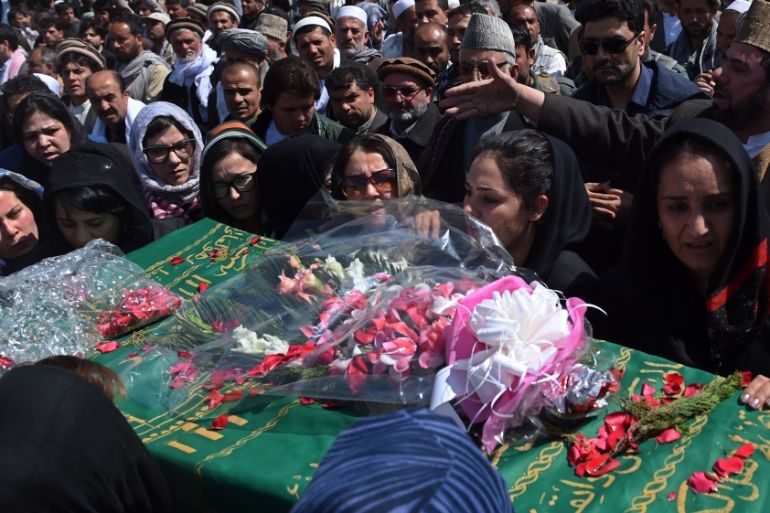Afghanistan trial in mob killing of woman begins
Forty nine suspects, who participated in mob that lynched Farkhunda over false accusations, face trial in Kabul.

The trial of 49 suspects accused of taking part in the mob that killed an Afghan woman falsely accused of burning a copy of the Quran has started in the capital, Kabul.
The opening of the trial on Saturday at Afghanistan’s Primary Court was broadcast live on nationwide television.
Keep reading
list of 4 itemsPalestinian Prisoner’s Day: How many are still in Israeli detention?
‘Mama we’re dying’: Only able to hear her kids in Gaza in their final days
Europe pledges to boost aid to Sudan on unwelcome war anniversary
The suspects, including 19 police officers, all face charges relating to the March 19 killing of the 27-year-old woman named Farkhunda.
A prosecutor read charges against 10 of the defendants, including assault, murder and encouraging others to participate in the attack. The policemen are charged with neglecting their duties and failing to prevent the attack, although some are suspected of actually participating.
Prosecutors have alleged that Farkhunda was beaten to death in a frenzied attack sparked by a bogus accusation that she had burned a copy of the Quran.
Nationwide outrage
Video of the assault circulated widely on social media. It showed Farkhunda, who like many Afghans went by only one name, being beaten, run over with a car and burned before her body was thrown into the Kabul River.
The incident sparked nationwide outrage and soul searching, as well as a civil society movement to limit the power of clerics, strengthen the rule of law and improve women’s rights.
|
|
| Murdered Afghan woman’s family demand justice |
Safiullah Mojadedi, head of the Primary Court, called for senior officials, including the Kabul Police Chief and the Interior Ministry’s chief criminal investigator to attend Sunday’s court session. He also ordered the arrest of another policeman who allegedly freed a suspect.
At least two of the accused told the court they had confessed under physical duress.
Afghanistan’s judicial system has long faced criticism for its inability to offer the majority of Afghans access to justice. Women especially are sidelined, despite constitutional guarantees of equality and protection from violence, a recent report by the UN said.